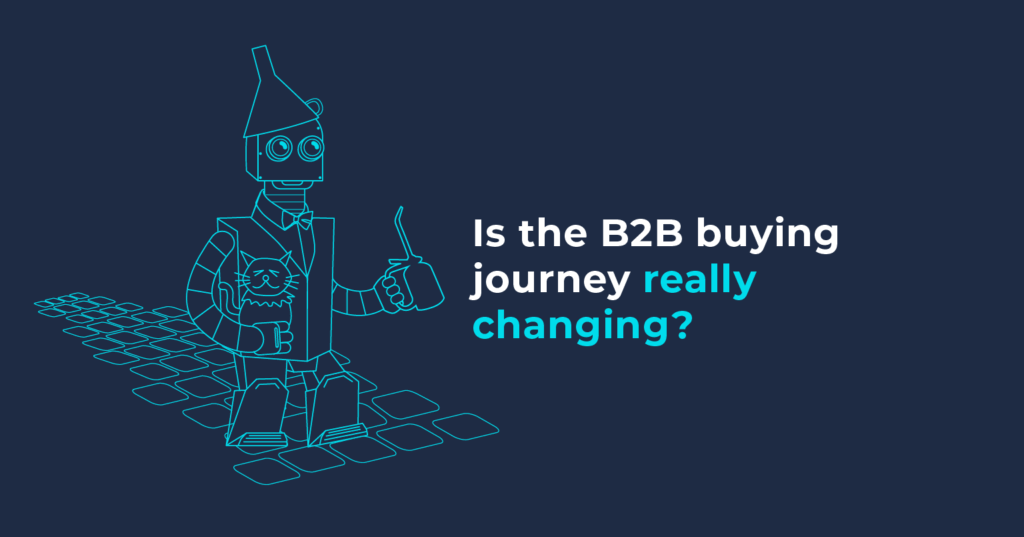Latest Google Business Profile Features B2B Brands Must Know
The latest Google Business Profile features are not cosmetic tweaks or background noise. They are quiet, continuous updates that reshape how Google understands businesses.
Reading: 0118 322 4395 | Manchester: 0161 706 2414 | Oxford: 01865 479 625 | info@sharpahead.com | Office hours: Monday-Friday 9:00am - 5:30pm
| Office hours: Monday-Friday 8:30am - 5:30pm
| Email | Office hours: Mon-Fri 9:00am - 5:30pm
Is the B2B Buying Journey Really Changing?
The B2B buying journey is changing at a faster pace than ever before, and B2B marketers must evolve their brand’s digital footprint now or risk obscurity and obsolescence in this new world.
The same guiding principles that have always led best practice haven’t really changed at all. First, the changes: the two key factors driving the rapid pace of change in the B2B buying journey are, quite simply, technology and demographics.

AI is changing B2B (re)search at a relentless pace: from AOIs taking over SERPs to the exponential rise of GenAI search tools, the way that B2B buyers research, search and gather information has evolved at breathtaking speed over the past 24 months.
We’ve been tracking the impact of GenAI tools on the B2B buying journey since October 2023, and a Forrester report from the end of last year revealed that 89% of B2B buyers have adopted generative AI (genAI), naming it one of the top sources of self-guided information in every phase of their buying process.
Tools including ChatGPT, Copilot, Gemini and Perplexity have quickly been adopted into everyday research practices, many of us treating them as the go to phone a friend assistant for our working, and personal, queries.
And for those queries where we still use traditional search, AI overviews have increasingly taken over the top of search engine results pages (SERPs). Although percentages vary by search type and region, one thing is clear: the frequency of AIOs appearing in SERPs is rising.
While both of these changes potentially pose an existential crisis for traditional content publishers, and have some SEO practitioners wringing their hands, for B2B marketers vying for prospects’ attention, they also require (immediate) changes to your digital strategy.
The second key factor is a demographic shift in who B2B marketers need to persuade. Helpfully, Forrester has also tracked this trend over the years, revealing that 71% of B2B buyers are millennials and Gen Zers.
And unsurprisingly, those younger buyers use digital technology, and think about buying, differently, than their older peers.
From the same Forrester blog, younger buyers:
Younger buyers use different social platforms—and use them differently.
Early this year Forbes reported that:
For Generation Z, visual storytelling rules their world, with Instagram (65%), YouTube (63%), and TikTok (58%) leading the pack and nearly half (46%) use these platforms as their go-to search engines.
And while Facebook remains the digital homebase for Millennials (68%), they actively network across Instagram and LinkedIn, blending their social and professional lives seamlessly.
And even as these numbers change, one thing remains certain: B2B marketers need to meet these buyers’ expectations and provide content and experiences across the digital platforms they inhabit.
So while everything must change, many things have not and B2B best practices remain best practices:
Keeping in mind these fundamental best practices, it’s time to develop a content strategy for the age of AI and a digital journey for younger buyers.
Our top tips:
And finally, trust your instincts as a B2B marketer— changes to the B2B buying journey can feel seismic, but the fundamentals of our best practices haven’t shifted.
Looking to revamp your digital footprint or develop a content strategy?
Get in touch with one of our B2B digital marketing experts, we are happy to chat and offer a free 30-minute consultation.
Receive our biweekly newsletter and stay up to date with the latest B2B digital marketing news and insights.
The latest Google Business Profile features are not cosmetic tweaks or background noise. They are quiet, continuous updates that reshape how Google understands businesses.
Between Christmas parties and wrapping up last year’s activity, you would be forgiven for missing Google’s December Core Update—so here’s a short and a longer summary for you!
LinkedIn continuously evolves its analytics to help businesses reach users and grow their online presence, and one of the most important updates is the new ‘Competitors’ tab.